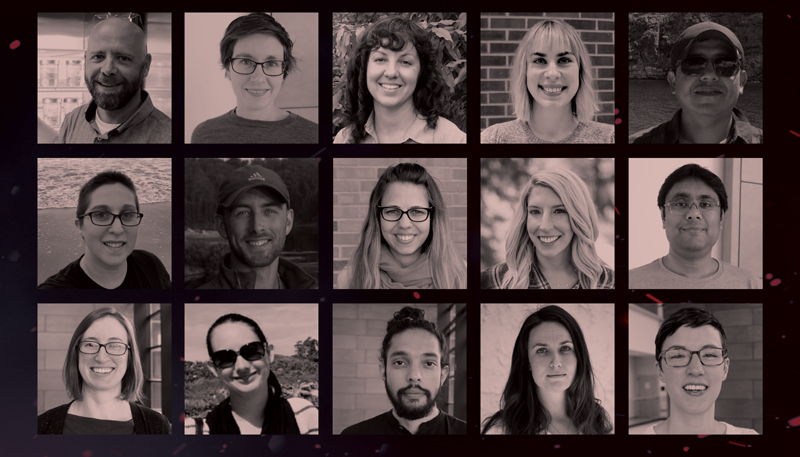Four years ago, the College launched a program designed to spark cross-disciplinary collaboration around biology-based, socially relevant problems. Here’s the story so far.

The Grand Challenges in Biology (GCB) Postdoctoral Program launched in early 2016 to support novel multidisciplinary collaborations. So far, the program has provided support for more than a dozen current and former postdoctoral researchers exploring a wide range of questions.
Why postdocs? They are uniquely positioned to do this work. “For the most part, they aren’t wholly focused on a specific area to the exclusion of all other areas of inquiry and they’re excited about learning new things,” says College of Biological Sciences Dean Valery Forbes. “In this program, postdocs bring faculty together who haven’t published jointly yet and lead the new collaboration.” Forbes created the program as a way to jump start cross-disciplinary research. “When I became dean, I wanted to figure out how to encourage people to work together. And not just within our College, but with other colleges and beyond the University of Minnesota - Twin Cities campus. I wanted to find a way to incentivize novel collaborations, and thus, the Grand Challenges in Biology Postdoctoral Program was born.”
The results so far are promising. Heath Blackmon, now an assistant professor at Texas A&M University, credits the experience with shaping his approach to research.
“Interactions with diverse faculty prepared me for collaborations with groups more diverse than you would typically get to work with in any one lab,” says Blackmon. “The GCB program was an essential part of my preparation for running my own lab.”
Courtney Passow, now an associate research scientist at Pharmaceutical Product Development, says, “I frequently bridge collaborations across multiple research labs. Because of this program, I can work easily with scientists in other universities and different industries.”
“In our College, we have the full breadth of biology and tremendous depth in the different sub-disciplines across biology,” says Forbes. “This program is a catalyst for collaboration across those many areas of expertise.
Grand Challenges Postdoctoral Researchers
Sean Ehlman: Exploring how animals adapt to variable environments caused by human disturbances, both in the short-term and long-term.
Ehlman works with Emilie Snell-Rood (evolution of learning, environmental variation) and Robert Sterner (biological limnology, biogeochemistry), from CBS and Duluth Large Lakes Observatory, respectively.
Allison GIll: Understanding how human-caused nitrogen fertilization changes the amount of carbon stored in terrestrial soils.
Gill works with Sarah Hobbie (ecosystem ecology, plant-soil interactions) and Jonathan Schilling (fungal biology), both CBS researchers.
Amanda Gorton: Gaining a better understanding of the distribution and dispersal of allergenic plants in urban areas will help foster just and equitable communities.
Gorton works with Allison Shaw (theoretical ecology), Bonnie Keeler (environmental economics), Jesse Berman (environmental epidemiology), from CBS, Humphrey School of Public Affairs and School of Public Health, respectively.
Laura Grieneisen: Improving an individual’s health through tailored solutions and understanding how individuals and communities adapt in a changing world.
Grieneisen works with Ran Blekhman (human genomics and microbiome) and Ruth Shaw (evolutionary quantitative genetics, plant population biology), both CBS researchers.
Nicole Hayes: Exploring whether nutrient-polluted lakes contribute to their own poor water quality by supporting algae and bacteria that create their own fertilizer.
Hayes works with James Cotner (microbial and biogeochemical ecology) and Cody Sheik (geomicrobiology, molecular biology), from CBS and Duluth Large Lakes Observatory, respectively.
Jenna Hicks: Preparing undergraduate students to tackle complex biological problems and analyze real biological data.
Hicks works with Ann Rougvie (gene expression, developmental mechanisms) and Anita Schuchardt (computational modeling, biology education), both CBS researchers.
Arjun Khakhar: Meeting the challenges posed to our global food systems with new tools used to rapidly reprogram plants and accelerate crop improvement. Khakhar works with Mike Smanski (natural product discovery, genome mining) and Daniel Voytas (plant genomics, genetic engineering), both from CBS.
Katie LaBarbera: Understanding how animals process complex information to identify risks, locate food and habitat, and evaluate potential mates.
LaBarbera works with Mark Bee (acoustic communication), Maria Gini (computer science) and Peggy Nelson (audiology), from CBS, College of Science and Engineering and the College of Liberal Arts, respectively.
Jesus Pinto Ledezma: Informing conservation and management responses in light of ongoing climate change and biodiversity losses.
Pinto Ledezma works with Jeannine Cavender-Bares (phylogenetics, physiological ecology) and Daniel Larkin (restoration ecology, plant community ecology), from CBS and the College of Food, Agriculture and Natural Resources Sciences, respectively.
Caitlin Looby: Quantifying the flux of carbon in tropical rainforests — often called the lungs of the planet — in changing climate conditions.
Looby works with Jennifer Powers (ecosystem ecology, biogeochemistry) and Jessica Gutknecht (soil environmental microbiology), from CBS and the College of Food, Agriculture and Natural Resources Sciences, respectively.
Sudipta Shaw: Examining the rapid decline in phosphorus — a critical resource worldwide — and subsequent decline of water quality due to run-off.
Shaw works with Mikael Elias (molecular evolution) and Bo Hu (biosystems engineering), from CBS and the College of Science and Engineering, respectively.
Heath Blackmon: Improving reproductive health in humans and domestic animals.
Current position: Assistant Professor; Texas A&M University
GCB Alumnus Heath Blackmon worked with Yaniv Brandvain (population genomics) and David Zarkower (sexual development), both CBS researchers.
Ana Morales-Williams: Grappling with biodiversity loss across ecosystems.
Current position: Assistant Professor, University of Vermont, Rubenstein School of Environment and Natural Resources
GCB Alumnus Morales-Williams worked with James Cotner (microbial and biogeochemical ecology) and Cody Sheik (geomicrobiology, molecular biology), from CBS and Duluth Large Lakes Observatory, respectively.
Courtney Passow: Exploring animals’ ability to adjust to rapidly changing conditions and extreme environments.
Current Position: Associate Research Scientist at Pharmaceutical Product Development
GCB Alumnus Courtney Passow worked with Suzanne McGaugh (conservation and population genetics) and Peter Tiffin (plant population and molecular genetics), both CBS researchers.
— Claire Wilson